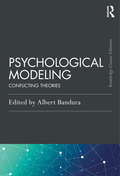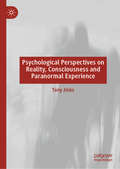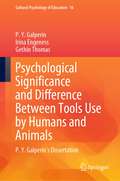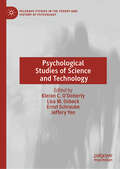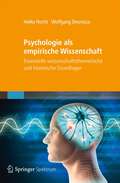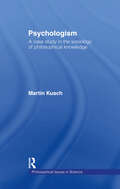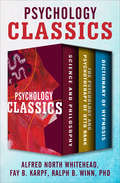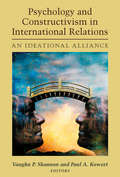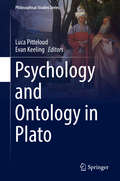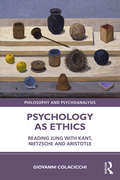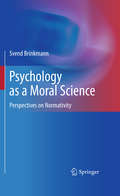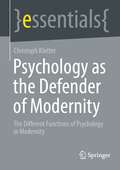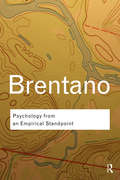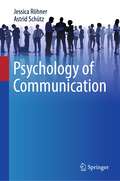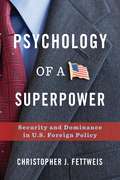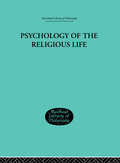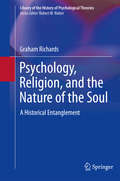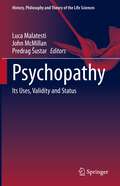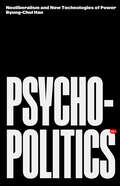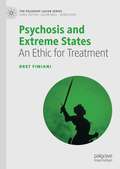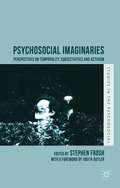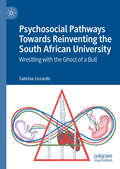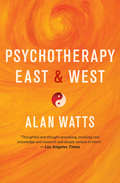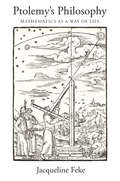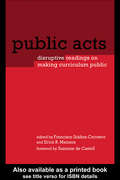- Table View
- List View
Psychological Modeling: Conflicting Theories (Psychology Press & Routledge Classic Editions)
by Albert BanduraThe Classic Edition of this key text highlights seminal work done in the subject of learning by modeling and offers an extensive review of the major theories, edited by one of the most influential psychologists of his generation. In his introductory essay, Bandura identifies the most important controversial issues in the field of observational learning and reviews a large body of research findings, before carefully chosen articles, written by a team of expert contributors, tackle a range of key debates in the field. Topics explored include the role of reinforcement play in observational learning, the scope of modeling influences, the types of people most susceptible to modeling influences, and the relative effectiveness of models presented in live action, in pictorial presentations, or through verbal description. Written in a lively and engaging manner, this book will be of interest to all psychology students interested in psychological modeling, as well as educators and professionals working with children.
Psychological Perspectives on Reality, Consciousness and Paranormal Experience
by Tony JinksThis book explores various explanatory frameworks for paranormal encounters. It opens with the story of an inexplicable human figure seen crossing a secluded hotel corridor, interpreted as a ghost by the sole witness. The subsequent chapters explore the three most important historical perspectives accounting for this and other types of paranormal experience. Each perspective is examined from first principles, with specific reference to what happened in the corridor, how it happened, why it happened, and who might be responsible. The first perspective considers the experience to be legitimate – to be something real – and various possibilities are presented that are grounded in the paranormal and parapsychological literature, among which a “ghost” is one putative explanation. In turn, the second perspective treats the experience as being wholly illegitimate. With reference to psychological theory, the ghost sighting is a product of erroneous consciousness. The third perspective is different yet again, and considers the sighting to be authentic, but argues that explaining the ghost requires a radical departure from conventional models of reality and consciousness. By contrasting these three paths, the book provides a valuable resource for readers interested in the philosophical and psychological origins of explanations for paranormal experiences, from the 19th century to the present. It will appeal to general readers in addition to students and scholars of parapsychology, anomalistic psychology, and consciousness studies.
Psychological Significance and Difference Between Tools Use by Humans and Animals: P. Y. Galperin's Dissertation (Cultural Psychology of Education #16)
by Gethin Thomas Irina Engeness P.Y. GalperinThis book represents the very first, so far unpublished, translation of Piotr Galperin’s (1902-1988) dissertation, defended in 1938 during his employment in the All-Ukrainian Psycho-Neurological Academy (AUPA) in Kharkiv, Ukraine. In his candidate dissertation Galperin examined the differences in tool use between humans and animals and argued that there was a fundamental difference between tools developed and used by humans and the auxiliary means used by animals. Galperin showed that human use of tools totally differs from the way tools are utilised by animals as ‘an extension’ of their limbs. He suggested that tools created and used by humans encapsulate cultural and historical experience developed in human practices which have to be mastered. Human engagement with these tools reorganise the existing and enhance the development of new psychological functions and that human consciousness originates and develops in the external tool-mediated activities. The development of new psychological functions stimulates the systemic and meaningful organisation of human consciousness. In addition, as opposed to animal mind, human consciousness undergoes developmental transformations initiated in tools- and speech-mediated activities.Galperin’s research reveals the unity of the external tool-mediated and the internal psychological activity of humans. These findings are influential as they adopted the foundations of the theory of Vygotsky and extended them without changing the essence of Vygotsky’s legacy. Galperin’s dissertation can be considered as a missing jig-saw puzzle which connects the legacy of Vygotsky, the contribution of Leontiev and their followers who worked in the cultural-historical and activity traditions. This translation of the dissertation in English makes it available for the cultural-historical scholars in the West and provides insights into the invaluable contributions of Piotr Galperin.
Psychological Studies of Science and Technology (Palgrave Studies in the Theory and History of Psychology)
by Lisa M. Osbeck Ernst Schraube Kieran C. O’Doherty Jeffery YenThis book provides a significant contribution to scholarship on the psychology of science and the psychology of technology by showcasing a range of theory and research distinguished as psychological studies of science and technology. Science and technology are central to almost all domains of human activity, for which reason they are the focus of subdisciplines such as philosophy of science, philosophy of technology, sociology of knowledge, and history of science and technology. To date, psychology has been marginal in this space and limited to relatively narrow epistemological orientations. By explicitly embracing pluralism and an international approach, this book offers new perspectives and directions for psychological contributions. The book brings together leading theorists and researchers from around the world and spans scholarship across a variety of traditions that include theoretical psychology, critical psychology, feminist psychology and social constructionist approaches. Following a historical and conceptual introduction, the collection is divided into three sections: Scoping a New Psychology of Science and Technology, Applying Psychological Concepts to the Study of Science and Technology and Critical Perspectives on Psychology as a Science. The book will interest interdisciplinary scholars who work in the space of Science and Technology Studies and psychologists interested in the diverse human aspects of science and technology.
Psychologie als empirische Wissenschaft
by Heiko Hecht Wolfgang DesnizzaIn einzigartiger Weise bietet dieses Werk einen Überblicküber die Grundfragen der Erkenntnistheorie, der Logik und der Geschichte derwissenschaftlichen Psychologie. In einem neuen, beispielorientierten Grundkursnehmen die Autoren zu den Grundbedingungen wissenschaftlichen Forschens überdie Seele Stellung. Diese Einführung soll Wegbereiter für ein Studium derPsychologie sein und ist zugleich anspruchsvoll und voraussetzungsarm.
Psychologism: The Sociology of Philosophical Knowledge (Philosophical Issues in Science)
by Martin KuschFirst published in 1995. Routledge is an imprint of Taylor & Francis, an informa company.
Psychology Classics: Science and Philosophy, The Psychology and Psychotherapy of Otto Rank, and Dictionary of Hypnosis
by Alfred North Whitehead Ralph B. Winn Fay B. KarpfThree classic texts in one: essays by Alfred North Whitehead, an authoritative study of Otto Rank, and an essential reference book on hypnosis. In Science and Philosophy, Alfred North Whitehead presents his mature thought on topics ranging from education to science and mathematics; from the theories of John Dewey to Albert Einstein. These collected essays cover his positions in a deep and extraordinarily unified way. Austrian psychologist Otto Rank is one of the most influential figures of modern psychotherapy. A protégé́ of Sigmund Freud, he made significant developments in the fields of analysis, psychotherapy, counseling, education, and social work. In The Psychology and Psychotherapy of Otto Rank, social psychologist Fay B. Karpf—who studied with Rank—presents an authoritative analysis of his pioneering work and legacy.Dictionary of Hypnosis has been an essential text on the subject since its first publication in 1965. Written by psychology professor Dr. Ralph B. Winn, this wide-ranging reference book provides a substantial amount of information on the history of hypnosis and its various uses in contemporary medicine, psychology and other sciences.
Psychology and Constructivism in International Relations: An Ideational Alliance
by Vaughn P. Shannon Paul Kowert"The conversation between political psychology and constructivism is essential and long overdue. By exploring the interaction of individual cognition and social processes, this 'ideational alliance' more fully explains how ideas work all the way down to shape world politics. " ---Theo Farrell, King's College London. "This is a worthwhile and engaging volume. Political psychology is gaining ground as an essential perspective to consider when analyzing international relations, and the book's focus on constructivism provides key insights into the relationship between identity, norms, and behavior---bedrock concepts in understanding the social underpinnings of global politics. " ---Mira Sucharov, Carleton University "An indispensable guide to understanding what distinguishes and what unites psychology and constructivism. A wonderful resource for political psychologists, constructivists, and their critics. " ---Jonathan Mercer, University of Washington Constructivist IR scholars study the ways in which international norms, culture, and identities---all intersubjective phenomena---inform foreign policy and affect the reaction to and outcomes of international events. Political psychologists similarly investigate divergent national self-conceptions as well as the individual cognitive and emotional propensities that shape ideology and policy. Given their mutual interest in human subjectivity and identity politics, a dialogue and synthesis between constructivism and political psychology is long overdue. The contributors to this volume discuss both theoretical and empirical issues of complementarity and critique, with an emphasis on the potential for integrating the viewpoints within a progressive ideational paradigm. Moreover, they make a self-conscious effort to interrogate, rather than gloss over, their differences in the hope that such disagreements will prove particularly rich sources of analytical and empirical insight. Jacket illustration © Ocean Photography/Veer
Psychology and Ontology in Plato (Philosophical Studies Series #139)
by Luca Pitteloud Evan KeelingThis edited volume brings together contributions from prominent scholars to discuss new approaches to Plato’s philosophy, especially in the burgeoning fields of Platonic ontology and psychology. Topics such as the relationship between mind, soul and emotions, as well as the connection between ontology and ethics are discussed through the analyses of dialogues from Plato’s middle and late periods, such as the Republic, Symposium, Theaetetus, Timaeus and Laws. These works are being increasingly studied both as precursors for Aristotelian philosophy and in their own right, and the analyses included in this volume reveal some new interpretations of topics such as Plato’s attitude towards artistic imagination and the possibility of speaking of a teleology in Plato. Focusing on hot topics in the area, Psychology and Ontology in Plato provides a good sense of what is happening in Platonic scholarship worldwide and will be of interest to academic researchers and teachers interested in ancient philosophy, ontology and philosophical psychology.
Psychology as Ethics: Reading Jung with Kant, Nietzsche and Aristotle (Philosophy and Psychoanalysis)
by Giovanni ColacicchiThrough his clinical work and extensive engagement with major figures of the philosophical tradition, Jung developed an original and pluralistic psycho-ethical model based on the cooperation of consciousness with the unconscious mind. By drawing on direct quotations from Jung’s collected works, The Red Book, and his interviews and seminars – as well as from seminal texts by Kant, Nietzsche, Aristotle and Augustine – Giovanni Colacicchi provides a philosophically grounded analysis of the ethical relevance of Jung’s analytical psychology and of the concept of individuation which is at its core. The author argues that Jung transforms Kant’s consciousness of duty into the duty to be conscious while also endorsing Nietzsche’s project of an individual ethics beyond collective morality. Colacicchi shows that Jung is concerned, like Aristotle, with the human need to acquire a balance between reason and emotions; and that Jung puts forward, with his understanding of the shadow, a moral psychology of the Christian notion of evil. Jung’s psycho-ethical paradigm is thus capable of integrating ethical theories which are often read as mutually exclusive. Psychology as Ethics will be of interest to researchers in the history of ideas and the philosophy of the unconscious, as well as to therapists and counsellors who wish to place their psychodynamic work in its philosophical context. It will also be a key reference for undergraduate and postgraduate courses and seminars in Jungian and Post-Jungian studies, philosophy, psychoanalytic studies, psychology, religious studies and the social sciences.
Psychology as a Moral Science
by Svend BrinkmannWhat does morality have to do with psychology in a value-neutral, postmodern world? According to a provocative new book, everything. Taking exception with current ideas in the mainstream (including cultural, evolutionary, and neuropsychology) as straying from the discipline's ethical foundations, Psychology as a Moral Science argues that psychological phenomena are inherently moral, and that psychology, as prescriptive and interventive practice, reflects specific moral principles. The book cites normative moral standards, as far back as Aristotle, that give human thoughts, feelings, and actions meaning, and posits psychology as one of the critical methods of organizing normative values in society; at the same time it carefully notes the discipline's history of being sidetracked by overemphasis on theoretical constructs and physical causes--what the author terms "the psychologizing of morality." This synthesis of ideas brings an essential unity to what can sometimes appear as a fragmented area of inquiry at odds with itself. The book's "interpretive-pragmatic approach": * Revisits core psychological concepts as supporting normative value systems. * Traces how psychology has shaped society's view of morality. * Confronts the "naturalistic fallacy" in contemporary psychology. * Explains why moral science need not be separated from social science. * Addresses challenges and critiques to the author's work from both formalist and relativist theories of morality. With its bold call to reason, Psychology as a Moral Science contains enough controversial ideas to spark great interest among researchers and scholars in psychology and the philosophy of science.
Psychology as the Defender of Modernity: The Different Functions of Psychology in Modernity (essentials)
by Christoph KlotterPeople in Germany have an indifferent to poor relationship with our society. In fact, modernity, i.e. the last 200 years, has given the population historically unprecedented progress: democracy, human rights, social security systems, nutritive abundance. Yet this is little appreciated. This may be due to the fact that, in Diderot's sense, we have to prove ourselves permanently, that is, we live in a meritocracy that produces suffering. However, totalitarian ideologies have also emerged and been implemented in modernity, for which modernity is also responsible. This essential shows that psychology, on closer inspection, turns out to be the defender of the good parts of modernity.
Psychology from An Empirical Standpoint
by Franz BrentanoFranz Brentano is one of the founding fathers of twentieth century philosophy, celebrated for introducing the concept of intentionality to philosophy as well as making significant contributions to ethics and logic. His work exerted great influence on major philosophers such as Edmund Husserl, but also philosophers travelling in the opposite direction, such Gottlob Frege. He counted Sigmund Freud amongst his students and Freud expressed great admiration for his teacher in several letters. Psychology from an Empirical Standpoint is Brentano’s most important and brilliant work. It helped to establish psychology as a scientific discipline, but did so in a highly original and distinctive manner by arguing for a form of introspectionism.? Brentano argued that consciousness is always unified and that the hallmark of the mind is that one’s thoughts are always directed towards something – his famous theory of ‘intentionality’ – arguments that have deep implications not just for philosophy but psychology, cognitive science and consciousness studies. With a new foreword by Tim Crane.
Psychology of Communication
by Jessica Röhner Astrid SchützThis successful textbook on the psychology of communication explains - here in English for the first time - how human communication works in a very understandable way. It begins with the explanation of central terms and the explanation of known communication models (e.g. the models according to Schulz von Thun, Watzlawick, Hargie and colleagues), then describes means of non-verbal and verbal communication and ends with a clear and structured summary of communication forms. Concrete fields of application, stumbling blocks (e.g. intercultural differences in communication), practical examples and digressions in the book round off what has been read and consolidate what has been learned. In addition, free learning materials are available on the Internet with which readers can test their knowledge acquisition.
Psychology of a Superpower: Security and Dominance in U.S. Foreign Policy
by Christopher FettweisWith the collapse of the Soviet Union, the United States was left as the world’s sole superpower, which was the dawn of an international order known as unipolarity. The ramifications of imbalanced power extend around the globe—including the country at the center. What has the sudden realization that it stands alone atop the international hierarchy done to the United States? In Psychology of a Superpower, Christopher J. Fettweis examines how unipolarity affects the way U.S. leaders conceive of their role, make strategy, and perceive America’s place in the world.Combining security, strategy, and psychology, Fettweis investigates how the idea of being number one affects the decision making of America’s foreign-policy elite. He examines the role the United States plays in providing global common goods, such as peace and security; the effect of the Cold War’s end on nuclear-weapon strategy and policy; the psychological consequences of unbalanced power; and the grand strategies that have emerged in unipolarity. Drawing on psychology’s insights into the psychological and behavioral consequences of unchecked power, Fettweis brings new insight to political science’s policy-analysis toolkit. He also considers the prospect of the end of unipolarity, offering a challenge to widely held perceptions of American indispensability and asking whether the unipolar moment is worth trying to save. Psychology of a Superpower is a provocative rethinking of the risks and opportunities of the global position of the United States, with significant consequences for U.S. strategy, character, and identity.
Psychology of the Religious Life (Barnes And Noble Digital Library)
by George Malcolm StrattonFirst published in 2002. This is Volume VI of seven in the Library of Philosophy series on the Philosophy of Religion. Written in 1911, the present study an attempt is made to describe some of the more significant features of religion, and to discover the causes that give them their peculiar character.
Psychology, Religion, and the Nature of the Soul
by Graham RichardsNeither a book about the psychology of spirituality nor America's ongoing turf wars between religion and science, Psychology, Religion, and the Nature of the Soul takes to task many of the presumed relationships between the two--from sharing common concerns to diametrically hostile opposites--to analyze the myriad functions religion and psychology play in our understanding of the human life and mind. Graham Richards takes the historical and philosophical long view in these rigorous and readable essays, which trace three long-running and potentially outmoded threads: that psychology and religion are irrelevant to each other, that they are complementary and should collaborate, and that one will eventually replace the other. He references a stunning variety of texts (from Freud and Allport to Karen Armstrong and Paul Tillich) reflecting the evolution of these ideas over the decades, to emphasize both the complexity of the issues and the enduring lack of easy answers. The eloquence of the writing and passionate objectivity of the argument will interest readers on all sides of the debate as the author examines: the religious origins of psychology, the original dichotomy: mythos versus logos, the authenticity of religious experience, Religion and personality, the problematic role of prayer and Religion in the history of psychotherapy. For those making a serious study of the history of psychology, Psychology, Religion, and the Nature of the Soul will inspire a fresh wave of critical discussion and inquiry.
Psychopathy: Its Uses, Validity and Status (History, Philosophy and Theory of the Life Sciences #27)
by John McMillan Luca Malatesti Predrag ŠustarThis book explains the ethical and conceptual tensions in the use of psychopathy in different countries, including America, Canada, the UK, Croatia, Australia, and New Zealand. It offers an extensive critical analysis of how psychopathy functions within institutional and social contexts. Inside, readers will find innovative interdisciplinary analysis, written by leading international experts. The chapters explore how different countries have used this diagnosis. A central concern is whether psychopathy is a mental disorder, and this has a bearing upon whether it should be used. The book’s case studies will help readers understand the problems associated with psychopathy. Academics and students working in the philosophy of psychiatry, bioethics, and moral psychology will find it a valuable resource. In addition, it will also appeal to mental health professionals working in forensic settings, psychologists with an interest in the ethical implications of the use of psychopathy as a construct and particularly those with a research interest in it.
Psychopolitics: Neoliberalism and New Technologies of Power (Futures)
by Byung-Chul HanExploring how neoliberalism has discovered the productive force of the psycheByung-Chul Han, a star of German philosophy, continues his passionate critique of neoliberalism, trenchantly describing a regime of technological domination that, in contrast to Foucault&’s biopower, has discovered the productive force of the psyche. In the course of discussing all the facets of neoliberal psychopolitics fueling our contemporary crisis of freedom, Han elaborates an analytical framework that provides an original theory of Big Data and a lucid phenomenology of emotion. But this provocative essay proposes counter models too, presenting a wealth of ideas and surprising alternatives at every turn.
Psychosis and Extreme States: An Ethic for Treatment (The Palgrave Lacan Series)
by Bret Fimiani“This brilliant and beautifully written book invokes a radical reorientation of the treatment of psychosis” Juliet Flower MacCannell, Author of Figuring Lacan and The Hysteric’s Guide to the Future Female Subject. “Bret Fimiani's book offers an illuminating presentation of the Lacanian approach to psychosis thanks to his clear style which presents Lacanian concepts with a wonderful accuracy, illustrated by examples from his psychoanalytic practice. The dynamic of his investigation challenges the fear of psychosis with testimonies of lived experiences, the Hearing Voices Network, and analysts who claim the unclaimed intelligence at work in psychosis." Francoise Davoine, co-author of History Beyond Trauma This book advances a theory of transference-in-psychosis with the aim of provoking a change in the way the experience of psychosis is understood and thus, clinically treated. It examines the function of ‘ethics’ in the ‘installation’ of transference in the treatment of psychosis and contends that the aim of the psychoanalytic experience is the creation of a new ethic for the analysand and for the treatment. Beginning from the premise that the body of the psychotic is a site of social contestation, the author draws upon the work of Freud, Lacan, Deleuze & Guattari and Apollon to reframe the problem of the ‘body’ (as an effect of language) and its relation to transference, and ethics, in treating psychosis. It argues that psychosis still has much to teach psychoanalysis about how psychoanalysis must continue to change in order to create/offer an approach that is effective for psychosis (versus neurosis) and provides a comprehensive psychoanalytic theory of psychosis that derives, at its core, from the experience of psychosis itself. The book’s synthesis of clinical and ‘peer model’ principles will provide readers with a way to understand and navigate potential transference impasses often encountered with purely clinical approaches. In doing so it provides a valuable new framework for practitioners and scholars working in clinical psychology, psychoanalysis, philosophy, critical theory, psychiatry and social work.
Psychosocial Imaginaries: Perspectives on Temporality, Subjectivities and Activism (Studies in the Psychosocial)
by Stephen FroshPsychosocial Imaginaries.
Psychosocial Pathways Towards Reinventing the South African University: Wrestling with the Ghost of a Bull
by Sabrina LiccardoThis book proposes a conceptual-empirical framework for exploring forms of continuity and change along psychosocial pathways in South African universities. It illustrates how the psychosocial pathways are grounded in the symbolic narratives and knowledges of young scientists, engineers and architects - all interlocutors in the research from which this book is based. Alala, Mamoratwa, Welile, Odirile, Kaiya, Amirah, Takalani, Nosakhele, Naila, Ambani, Khanyisile, Itumeleng, Ethwasa and Kgnaya provide collective standpoints in the multiplicities within and between the lived lives and told stories of young Black South African women in Science, Technology, Engineering, and Mathematics (STEM) fields. In doing so, this compelling work advances possibilities for demythologising scientific endeavour as a white male achievement and shifting knowledge communities across gendered, racialised, class and national divides.This book presents an innovative narrative methodology, utilising the myth of the Minotaur to examine the state of the university at the heart of the hierarchical labyrinth in “post”-apartheid South Africa. Throughout the work the author wrestles with and self-reflexively highlights her own positionality as a white, middle-class South African woman to examine how this affects the production of this research in ways which serve to preserve the colonial knowledge system. With the rise of the Rhodes Must Fall and Fees Must Fall student movement in South Africa, demanding for the fall of institutionalised racial hierarchies, the author uses the cover image of narrative formations in the spirit of exploration to think with and through undulating networked forms that could possibly forge new psychosocial pathways towards decolonising and reinventing South African universities. This work offers a unique conceptual and methodological resource for students and scholars of psychosocial and narrative theory, as well as those who are concerned about the politics of higher education, both in South Africa and in other contexts around the world.
Psychotherapy East & West
by Alan WattsBefore he became a counterculture hero, Alan Watts was known as an incisive scholar of Eastern and Western psychology and philosophy. In this 1961 classic, Watts demonstrates his deep understanding of both Western psychotherapy and the Eastern spiritual philosophies of Buddhism, Taoism, Vedanta, and Yoga. He examined the problem of humans in a seemingly hostile universe in ways that questioned the social norms and illusions that bind and constrict modern humans. Marking a groundbreaking synthesis, Watts asserted that the powerful insights of Freud and Jung, which had, indeed, brought psychiatry close to the edge of liberation, could, if melded with the hitherto secret wisdom of the Eastern traditions, free people from their battles with the self. When psychotherapy merely helps us adjust to social norms, Watts argued, it falls short of true liberation, while Eastern philosophy seeks our natural relation to the cosmos.
Ptolemy's Philosophy: Mathematics as a Way of Life
by Jacqueline FekeThe Greco-Roman mathematician Claudius Ptolemy is one of the most significant figures in the history of science. He is remembered today for his astronomy, but his philosophy is almost entirely lost to history. This groundbreaking book is the first to reconstruct Ptolemy’s general philosophical system—including his metaphysics, epistemology, and ethics—and to explore its relationship to astronomy, harmonics, element theory, astrology, cosmology, psychology, and theology.In this stimulating intellectual history, Jacqueline Feke uncovers references to a complex and sophisticated philosophical agenda scattered among Ptolemy’s technical studies in the physical and mathematical sciences. She shows how he developed a philosophy that was radical and even subversive, appropriating ideas and turning them against the very philosophers from whom he drew influence. Feke reveals how Ptolemy’s unique system is at once a critique of prevailing philosophical trends and a conception of the world in which mathematics reigns supreme.A compelling work of scholarship, Ptolemy’s Philosophy demonstrates how Ptolemy situated mathematics at the very foundation of all philosophy—theoretical and practical—and advanced the mathematical way of life as the true path to human perfection.
Public Acts: Disruptive Readings on Making Curriculum Public
by Erica R. Meiners Francisco Ibáñez-CarrascoAs this book documents local, specific, and contextualized acts of resistance and offers a detailed analysis of varied forms of public literacies, it functions as a template to inform and inspire resistant practices in diverse communities.
